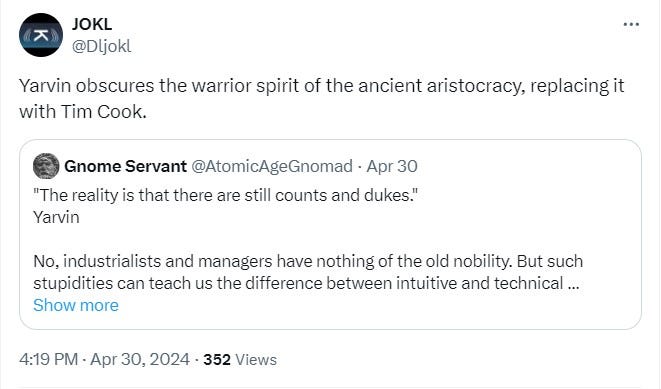Curtis Yarvin's Neoreactionary Case for a Biden Monarchy, by Robert Stark
Neoreactionary Monarchist, Curtin Yarvin, makes the case not just for the re-election of Biden/Harris but to “put Joe Biden entirely in charge of the government.” Yarvin basically advocates for Joe Biden to become an absolute monarch. Yarvin has remained a lifelong Democrat, even though the media has smeared him as a right-wing fascist. However, he adds “Or Donald Trump. Or whoever else wins the election. With no checks and balances. That’s right.”
Yarvin argues that Biden would no longer care about liberal opinion and, thus would pivot to the Right. He also says that if granted absolute power, Trump would become more liberal, as he no longer has to pander to conservatives. Yarvin is probably right that wokeness and culture war issues would be resolved if Democracy were abolished. Yarvin is also right that Democrats are more competent at enacting their agenda than Republicans and that conservatives are losers with little to no elite attributes.
Yarvin predicts that Biden, as an absolute monarch, would end state political repression as “Once any power triumphs completely, it no longer has any enemies,” and thus will make peace with former adversaries. While Yarvin gives the example of America’s relative benevolence towards the defeated Germans and Japanese, after WWII, he glosses over the Soviet’s brutal revenge against Germany, the Communist Revolution, and countless other historical examples of new totalitarian regimes that brutally purged their former adversaries. If granted absolute power, Biden would almost certainly persecute his opponents.
There is a case that a benevolent monarch or dictator, with noblesse oblige towards the people, is preferable to a democratically elected leader. However, this scenario is conditional upon the right person being in power rather than the default of power. Yarvin makes a valid point that FDR was able to accomplish a lot by limiting democracy. However, it was the threat of fascism and communism rising domestically that pressured FRD to make concessions to the people. In contrast, America’s existing ruling class does not feel any pressure to make any concessions.
Yarvin also assumes that a hypothetical King Biden would not have the Deep State dictating his terms, which is nonsense, as dictators and monarchs still rely upon the loyalty of an apparatus. Many Royal Courts became bureaucratic, such as the late-stage French aristocracy before the Revolution.
Despite the Uni-Party, gridlock and political polarization in US politics can be good, as far as preventing bad policies from being enacted. In contrast, Canada and the UK, which have much stronger technocratic establishment centers, are worse as far as open borders, austerity, and the suppression of dissent. Yarvin also makes a good point that the regime needs to be honest with its subjects. Mass democracy does not allow for that but rather gaslights people that they matter politically when they don’t matter.
source: @Dljokl on X
Yarvin’s proposal to make Biden king is similar to his fantasy of granting tech CEOs and corporations total power over society. Corporations are responsible for many of society’s problems, including income inequality, mass immigration, cultural degradation, environmental degradation, and the erosion of privacy. Not to mention that innovation is stagnating with tech companies primarily focused on apps or Apple just putting out new versions of the iPhone that aren’t dramatically better. Even AI will likely be used to replace jobs, make people more atomized and mentally ill, and increase the surveillance state rather than greatly improving people’s lives.
Yarvin also pushes the narrative that corporations are superior to the Government because they are more efficient, which has a partial degree of truth. However, corporations and government are more like each other than either conservatives or progressives would like to admit. Government bureaucracies can be ruthlessly efficient when they have a clear power objective and corporations increasingly function like bureaucracies, with massive HR departments and a lot of paper-pushing middlemen positions.
Yarvin has ties to Silicon Valley elites like Peter Thiel, so it makes sense that he would embrace this position. While I am much more idealistic about how society should ideally be, I get the ruthless pragmaticism of working with those who currently have wealth and power, and to align with and try to influence the least bad factions of the elite. This applies to Elon Musk, who has major flaws and has made some terrible decisions. For instance, he amplifies the most obnoxious rightwing grifters on Twitter/X and his new Cyber Truck looks like a Garbage Dumpster. However, Musk is at least open-minded to anti-establishment ideas and often f-cks with other factions of the elite.
Recently, Silicon Valley entrepreneur and investor, Balaji Srinivasan, who is sympathetic to Yarvin’s ideas and the Dark Enlightenment ideology, got a lot of flack for his proposal to radically transform San Francisco. In a podcast interview on how the Tech Tribe can save cities, Balaji called for something like tech Zionism, where San Francisco becomes a tech corporation-governed city, as if that isn’t already the case. Balaji calls for “the greys, ” citizens loyal to tech companies, to take over San Francisco by allying with the Police. Balaji is right about the failure of San Francisco’s leftwing political leadership, but glosses over that San Francisco really started going downhill in the 2010s, coinciding with the takeover by the “Tech Tribe.”
Both Balaji and Yarvin seem to envision the Bay Area as a Singapore-like autocratic City State that is culturally cosmopolitan rather than conservative. Balaji’s proposal also fits in with Charter Cities, which are popular with the techno libertarian crowd. I am not necessarily opposed to charter cities, I just don’t want major corporations running them and would rather have them run like guilds.
I am sympathetic to N orman Mailer’s proposal from when he ran for New York mayor, where each neighborhood becomes semi-autonomous with control over housing policy, the schools, and the police. I have been promoting enclavism or ethnopluralism for the Bay Area and California, but it obviously can’t be viewed as a reactionary movement like MAGA. To be implemented, it would have to appeal to or co-opt White limousine liberals, as well as immigrants and minorities who already practice enclavism. I agree with Yarvin that it is important to be where the elites are and it is defeatist to talk about running off to Idaho.
Elites must demonstrate that they can uplift civilization to have legitimacy. The elites suck but the masses don’t have what it takes to rule society either. There are countless brilliant creative people with the best ideas, who can’t get access to capital or elite institutions. Capitalism is terrible at selecting for elites and a monarchy of the merchant or managerial class with the power of aristocracy without aristocratic traits, would be the worst system imaginable. I favor something in line with Plato’s proportional inequality, where power is shared between warriors, merchants, artists, spiritualists, and workers’ guilds, to prevent one caste from totally dominating society.
Yarvin points out “Aristotle’s basic principle that no form of government suits all peoples in all times.” Mass Democracies and especially multi-ethnic democracies tend to revert to autocracy, as no constituency can get their needs met democratically. However, the solution is not to abolish democracy but rather to have democracy serve constituencies on a smaller scale or to be radically decentralized. For instance, a confederation of city-states or semi-autonomous zones.
A counterpoint to neoreaction is that America’s political system has become much worse as it has become less democratic and more of an oligopoly. America’s golden age from the 1950s to 1980s, when the middle class was at its peak, was much more democratic. Not to mention that California is much worse off under one-party rule.
Yarvin is critical of anti-CRT activist Chris Ruffo, on the grounds that as an activist Ruffo just protests without addressing power dialects. However, both Yarvin and Ruffo offer critiques of politics and society, but come short at offering any solutions nor have a coherent program to reform society. While I am inclined to say that Yarvin is brilliant at describing the mechanisms of power, there are major intellectual flaws with his thesis. He seems to worship power for the sake of power rather than valuing the caliber of those with power. Like Richard Spencer, as a Nietzschean, he respects power, and thus bows to the current neoliberal elite.




